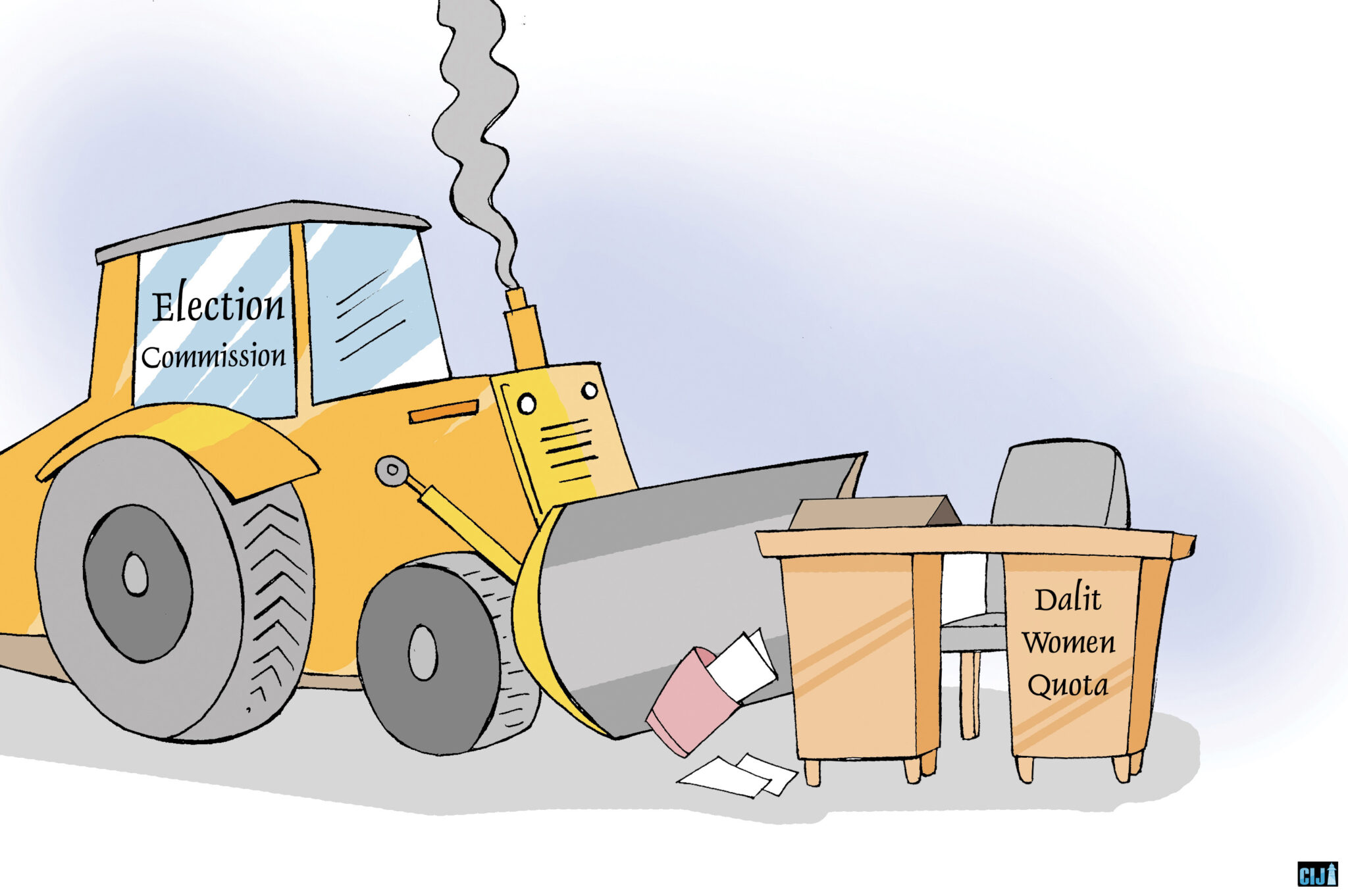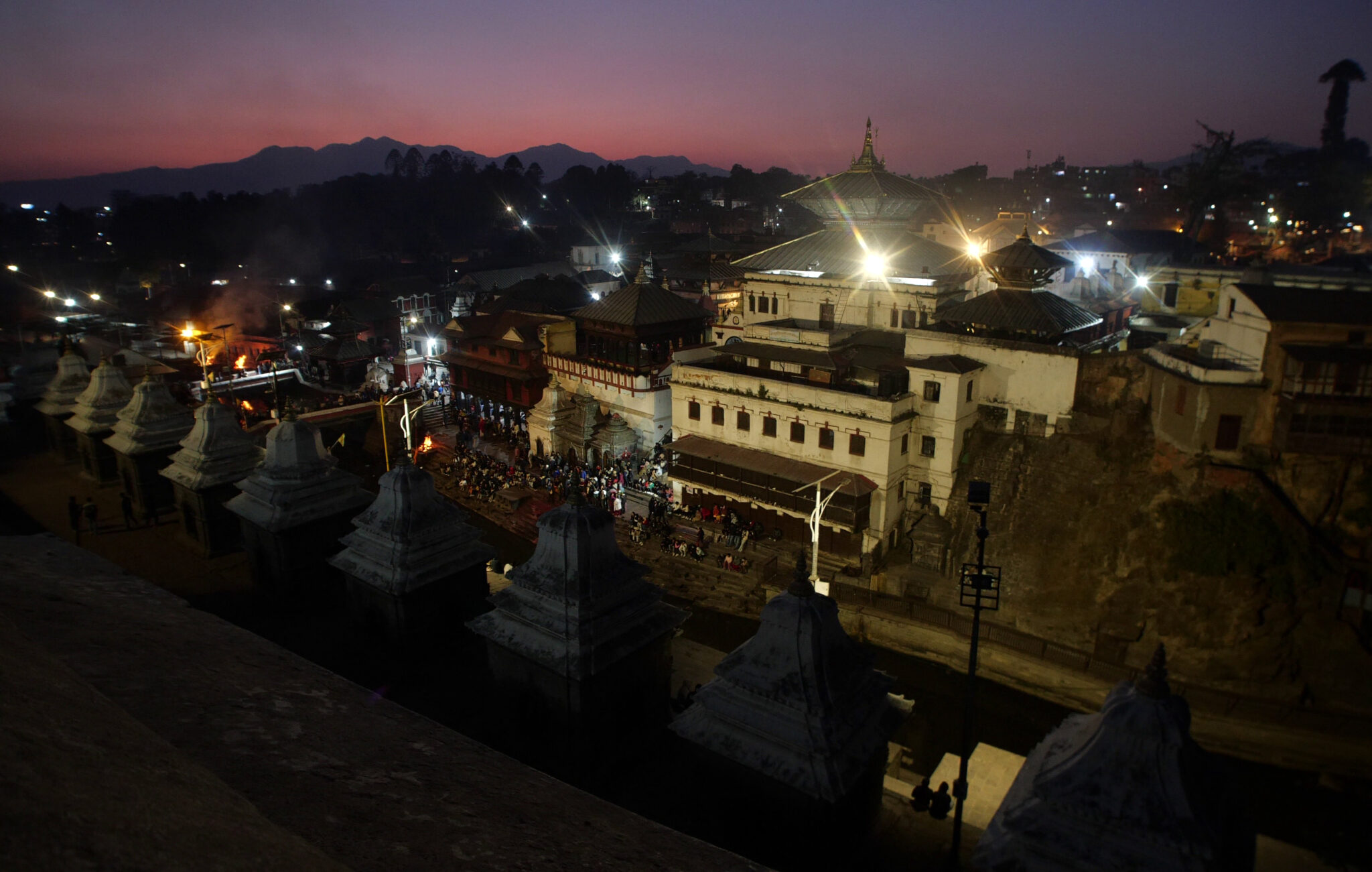Parties, and organisations close to them, have captured thousands of ropanis of public land. But the land administration hasn’t bothered to question them.
Ramesh Kumar |CIJ, Nepal
The main opposition party CPN-UML on April 22 launched its new headquarters at Tulsilal Memorial Building in Chyasal, Lalitpur. The headquarters were previously located at a businessperson’s house in Thapathali. The land where the new head office is based, however, is under the Nepal government’s ownership.
Both the UML’s decision to use land belonging to the government and the Memorial Trust’s decision to let a political party use the land and building appear illegal. Legally, the Trust’s land usage rights have already expired, with it now belonging to the government. That means the building based on government land is being used illegally by the main opposition. But then, even if the usage rights of the land were with the Trust, it would still be illegal to allow the party to use it.
A cabinet meeting of February, 2002 had granted Tulsilal Memorial Trust, composed of UML leaders, the rights to use the 12 ropani 6 aana 5 paisa land of kitta number 139 in Chyasal.
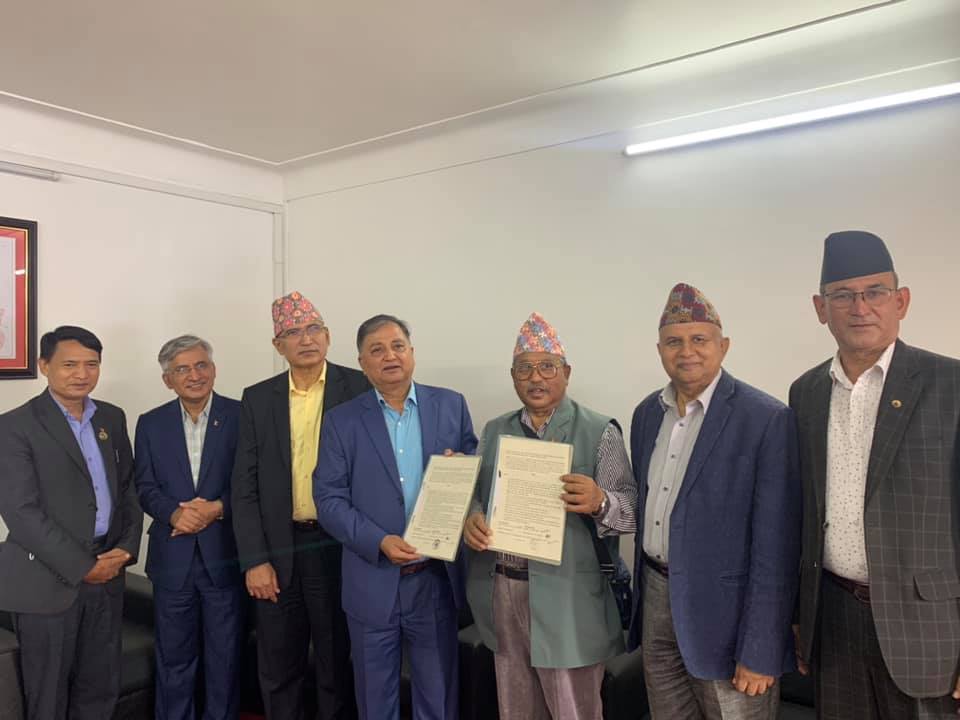
The central office of the CPN-UML in Tulsilal Memorial Trust.
But after other organisations with similar rights increasingly misused the land, the cabinet took an important decision in 2071BS. The decision said that the public land would now have to be compulsorily leased.
A methodology published in the national gazette on December 22, 2014 had incorporated that compulsory provision.
After that provision came into force, the Ministry of Land Management, Cooperatives and Poverty Alleviation published notices twice, on March 29, 2015 and on May 4, 2074, giving the organisations in question a deadline to follow through the provision. The Subject 21 (8) of the methodology states, in effect, “If the organisations do not turn the land into leased one within the deadline, the Nepal government will take it back.”
But the Tulsilal Trust didn’t even start the process to lease the land, thereby ceasing its usage rights to the government. Despite that, however, the government hasn’t bothered to transfer the rights of the land being used by the UML.
Janakraj Joshi, spokesperson of the Land Management Ministry, said the usage rights of the land was rendered void by formulating law after it was found that the land was being misused—that is, used for a different purpose than what was stated.
“According to the law, no organisation anywhere has the ownership rights of public land,” he said. “If any organisation is claiming it, then that’s illegal.”
On 7 May, 2017, the Department of Land Management issued a circular to all the public land offices across the country, asking them to cancel the usage rights of all organisations who haven’t launched the process to lease the land. But after this direction went unheeded, the ministry on 26 August, 2020 issued another circular to the land offices and on September 9 declared the usage rights of organisations had expired.
According to Joshi, legally, all the public lands are now under government rights.
The Tulsilal Trust, however, claims the government can’t revoke the usage rights of the land. Chair of the Trust and a UML leader, Gopal Shakya, says the trust will neither lease the land nor hand its rights to the government.

Shakya adds that they are in ‘internal talks’ with the government to keep the rights intact with the Trust. “It’s not necessary for the media to highlight this issue now,” he said. “We will sort it out through internal discussions.”
But there’s also a rift inside the Trust itself about the issue. Deputy chair of the Trust, Krishnalal Maharjan, alleges chair Shakya of unilaterally renting the land to the UML. He further said that the UML pays a monthly rent of Rs400,000 and he has notified his dissent about it in the Trust’s meeting.
Meanwhile, Joshi of the Ministry says the usage granted to an organisation with aims of social work can’t be transferred to a third party. According to a 2062BS policy on public land ownership, if the land is used for other reasons than the stated ones, or the organisation doesn’t abide by the provisions or is given to a third party, the government can revoke the rights. Another 2071BS policy also has a provision to the same effect.
The Trust’s website mentions that the Nepal government, Bagmati provincial government, Lalitpur Metropolitan and Indian government have made financial contributions for the construction of the Trust’s building.
According to section 21 (d) of the 2073BS Act related to political parties, no political party can use public land or encroach on it without government authorisation. This provision too bars political parties from using public land.
But the UML has been using the land, contrary to the provision. Dr Bhisma Adhikari, secretary of the UML party office, said that the office is run from the building for five years after an agreement with the Trust.
“The UML has itself invested in the building and structure in that place,” he said. “The party pays the Trust regularly for allowing it to use the land.”
The play of the powerful
The central office of the Loktantrik Samajbadi Party, chaired by Mahanta Thakur, is housed at a white, five-storey building behind the office of Department of Forests and Soil Conservation in Babarmahal. But the LoSaPa’s office that spreads over one ropani is not built on its own land; it was built on government land.
On 16 February, 2012, the government had granted the usage rights of the land to Nepal Madhesi Civil Servants’ Forum, considered close to the LoSaPa. But after the organisation failed to upgrade its legal status as a trade union, its legality remains in question.
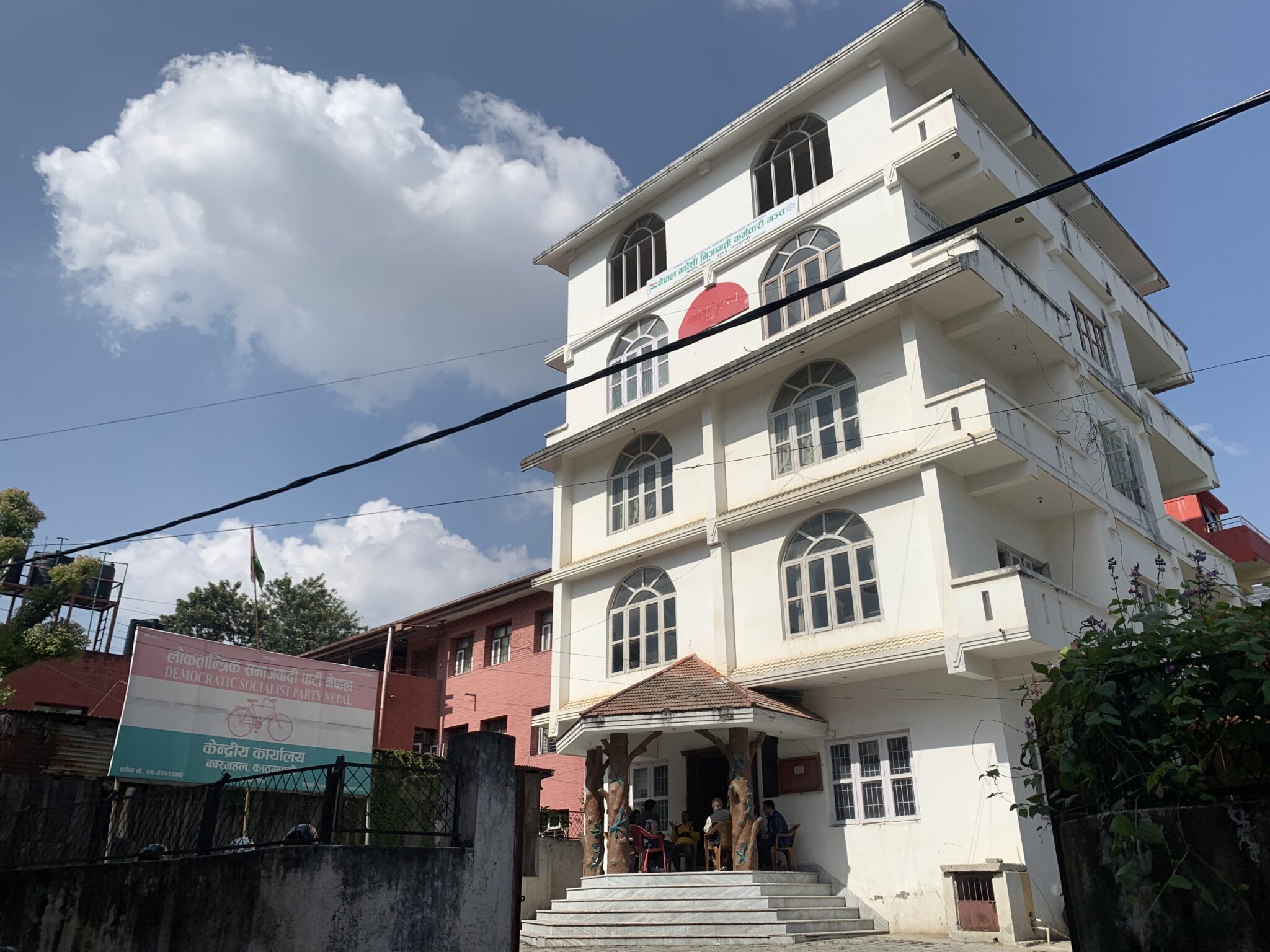
The central office of Loktantrik Samajbadi Party in Babarmahal.
Like the UML, the LoSaPa too has housed its party office in government land. Before the LoSaPa was formed, the Janata Samajbadi Party and Rastriya Janata Party too had their central office at the same place. According to Bhuwaneshwar Chaudhary, chair of the forum, they have started the process to remove the LoSaPa’s office. “We have already asked them to vacate the office,” he said.
This trend of granting rights of government land to groups with vested interests increased rapidly after around 2007.
According to the Land Administration department of the Land Management Ministry, the cabinet in various dates has so far distributed 18805 ropani of land to 351 organisations for their use.
After many of these lands were not leased, legally their usage rights have already been revoked. But the government has shied away from taking those lands back; on one hand, many groups with vested interests have claimed those lands, while on the other, public land and open space are vanishing.
Nepal Medical Association has even run a business in public land. The association, considered close to the Nepali Congress, has built a business complex in Pradarshani Marg, Kathmandu in 2 ropani 9 aana land. The four-storey NMA Complex that lies besides Kathmandu Model Hospital has banks and shops set up. The NMA’s right to use the land, however, is already over.
On April 2, 2008, the Girija Prasad Koirala-led cabinet had handed over this expensive land of kitta number 188 in Kathmandu Metropolitan’s ward 31 to the NMA.
The association’s general secretary, Dr Badri Rijal, says his organisation has launched the process to lease the land. “The process is incomplete because of some issues related to documentation,” he said. “It will now move forward.”
The fact that organisations close to political parties are using public land illegally shows the parties are protecting these illicit maneuverings.

The building of the UML-backed Nepal Civil Servants Association near Singhadurbar.
The Nepal Civil Servants’ Association, close to the UML, has been misusing the one ropani land near Singhadurbar’s southern gate.
The organisation has been taking ownership of a business complex at that location since 8 November, 2011 and is benefitting from it. But it hasn’t moved forward with the process to lease the land. Neither has the government braved to take it back.
Nepal Civil Servants’ Union, close to the Nepali Congress, also has been using the one ropani land behind the Department of Forests and Land Conservation in Babarmahal.
The one-storey building on the land houses the union’s office. Chair Gopal Pokharel says the government had granted the land for their use and claims they haven’t misused it.
“Unlike other organisations, we haven’t rented it out,” he said. Another organisation close to the Congress, Nepal Teachers’ Association, has received the one ropani seven aana land of kitta number 74 in Kathmandu-4.
Capturing land in the name of vaunted political figures
The interest groups are also capturing lands granted to organisations established to honour noted political personalities of past.
The government has granted 124-ropani land in Machchhegaun, Kathmandu to the Pushpalal Memorial Academy. The academy is chaired by Madhav Kumar Nepal, chair of the Unified Socialist party. A 3 ropani 9 aana land is given to the Pushpalal Memorial Garden in Sitapaila. Even though the usage rights of these lands are already over, the organisations are still using it.
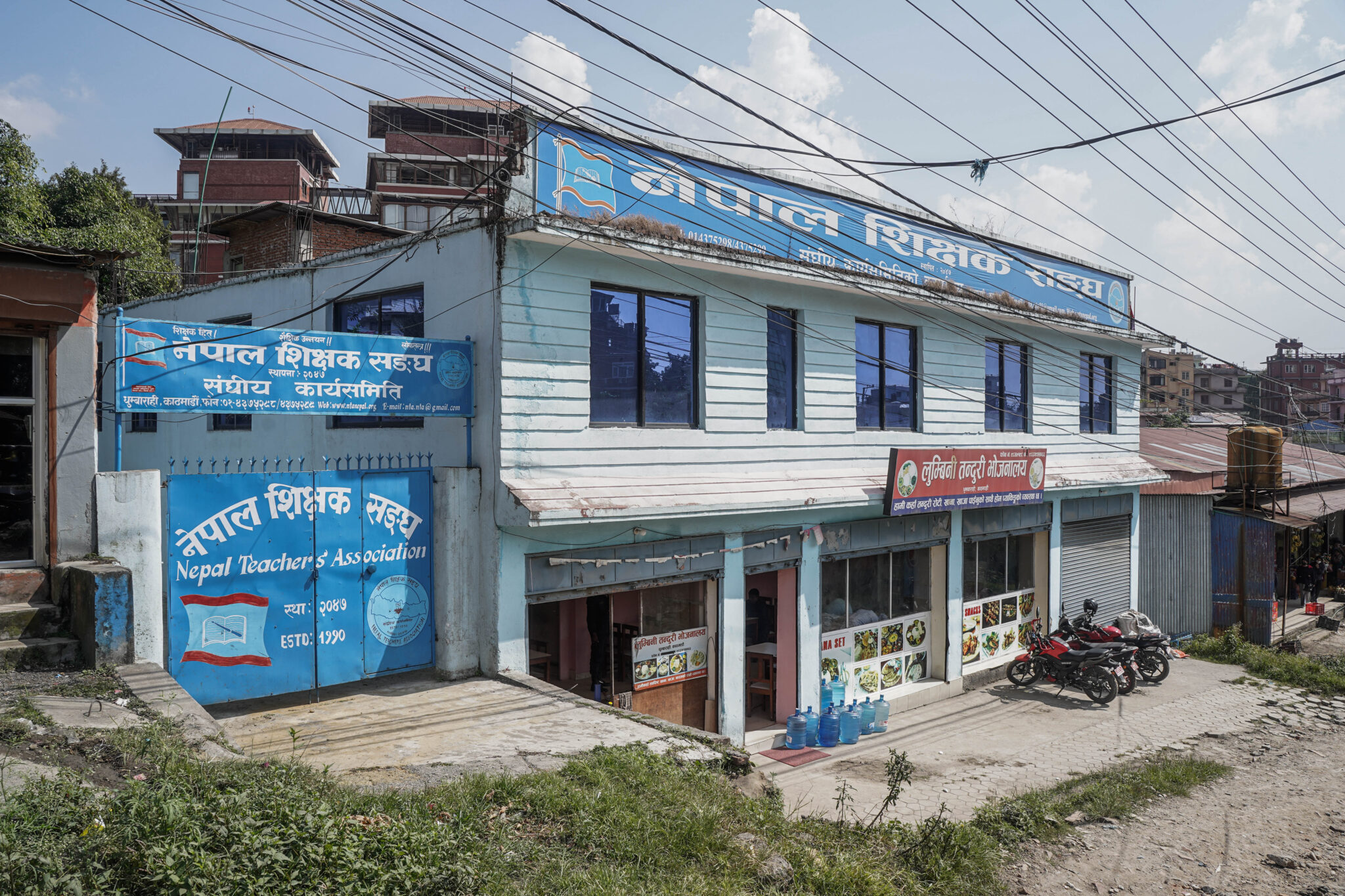
The building of Nepal Teachers’ Association close to Nepali Congress that has been rented out.
Meanwhile, the academy’s general secretary and a leader of Unified Socialist Dr Gangalal Tuladhar says the land granted by the government can’t be returned. “We do not agree with the government’s proposal to hand over the ownership,” he said. “We won’t allow the government to take back land with buildings that we made.”
In the name of then general secretary of the UML Madan Bhandari, hundreds of ropanis of land has been distributed.
Records at the Land Management Ministry state that a 3 ropani 4 aana 8 dam land of kitta 8 in Kathmandu-10 is provided to the Madan Bhandari Research Centre. Decisions on September 1, 2009 and 26 April 2010 a 7 kitta land of around 429 ropani area in the then Danchhi and Baluwa village development committees was provided for the proposed Madan Bhandari University.
Likewise, the Ganeshman Singh Memorial Garden has received 175 ropani land in Bhaktapur’s Katunje.
Though the usage rights of these lands are already revoked, the government hasn’t taken back control.
Even though the government’s stated goal of granting usage rights is for social work purposes, in practice it seems to be given to interest groups.
The cabinet decision on 20 February, 2007 granted usage rights of 4 ropani 5 aana land in Dhumbarahi to the Pasang Lhamu Mountaineering Academy, where operators of the Yeti Air are involved. The building constructed on the land also hosted the UML’s party office. After it received criticism that it was misusing government land, the UML shifted the office in April, 2021.
Likewise, the Janamaitri Hospital, considered close to the CPN Maoist, received a three kitta land of 86 ropani 4 aana area in Jitpurfedi, Kathmandu on 8 November, 2011.
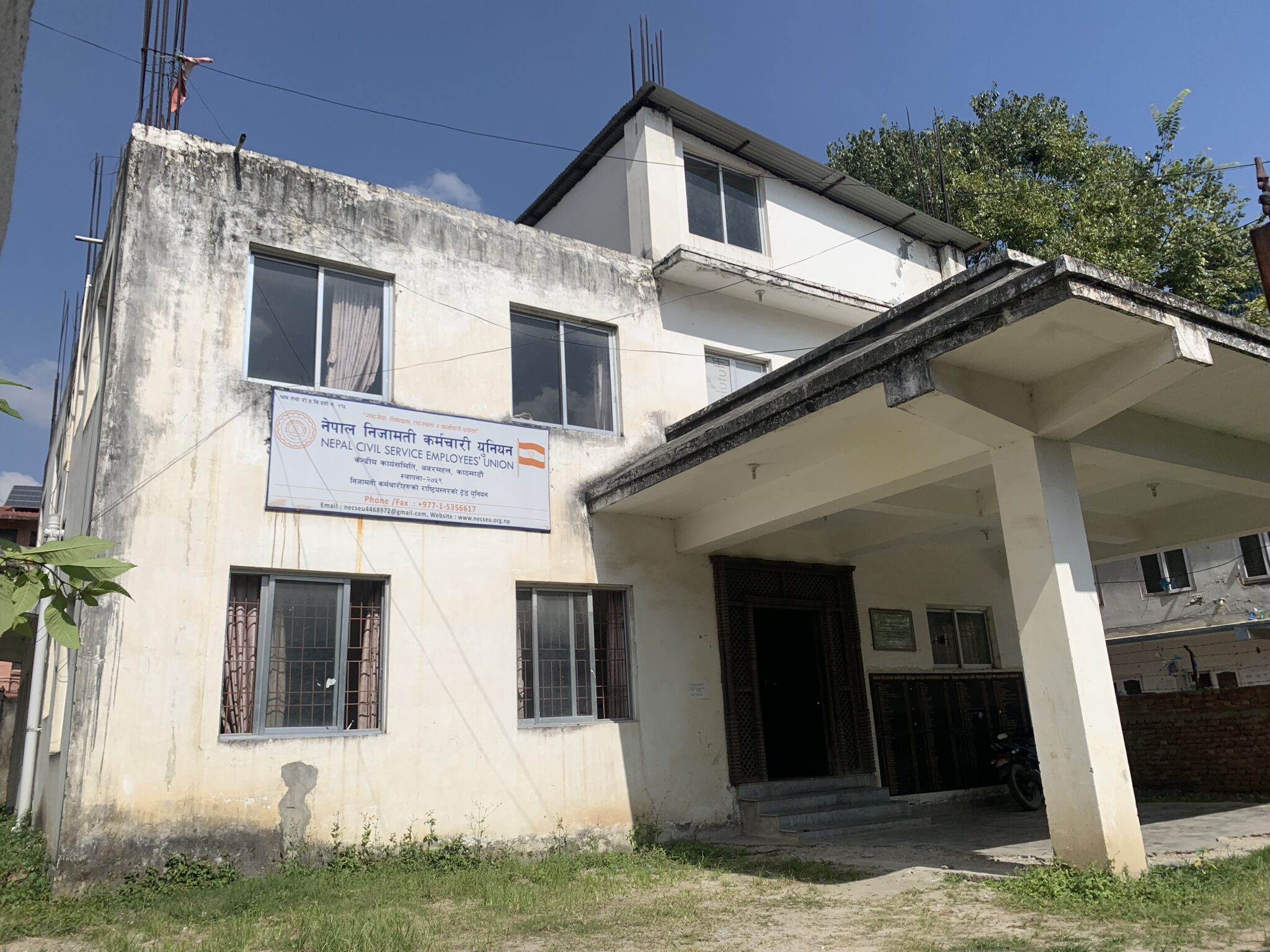
The hospital is now owned by the incumbent state minister Umesh Shrestha, and though it planned for an expansion, the locals have resisted, says Mahesh Tamang of Tarakeshwar-3.
“The hospital couldn’t move forward with its plan after the locals protested that an expansion would result in a loss of forests and public lands,” Tamang said.
A June, 2013 meeting of the cabinet decided to grant a 77 ropani 12 aana land in Budhanilkantha-8 to Marxist Gurukul, established in leadership of Swanam Sathi, among others. The organisations Helping Hands and Sankalpa Nepal too received 20 ropani land each in then Indrayani VDC-8 in Kathmandu.
Even though Sankalpa Nepal received a government grant of Rs60.01 million for construction of Senior Citizen Village, it didn’t move the work forward citing the disruption of 2015 earthquakes. The Office of the Auditor General’s 59th report has said that the grant should be returned back, citing suspected irregularities.
The organisation had received that grant when Kamala Parajuli, incumbent chair of National Women’s Commission, was chair of Sankalpa Nepal. Parajuli is a former member of UML’s publicity department.
Likewise, the Helping Hands Hospital’s mother organisation Helping Hands is considered close to the UML. Dr Guptabahadur Shrestha, acting chair of the hospital, said they are looking for a donor to construct a non-profit hospital on the government-granted land.
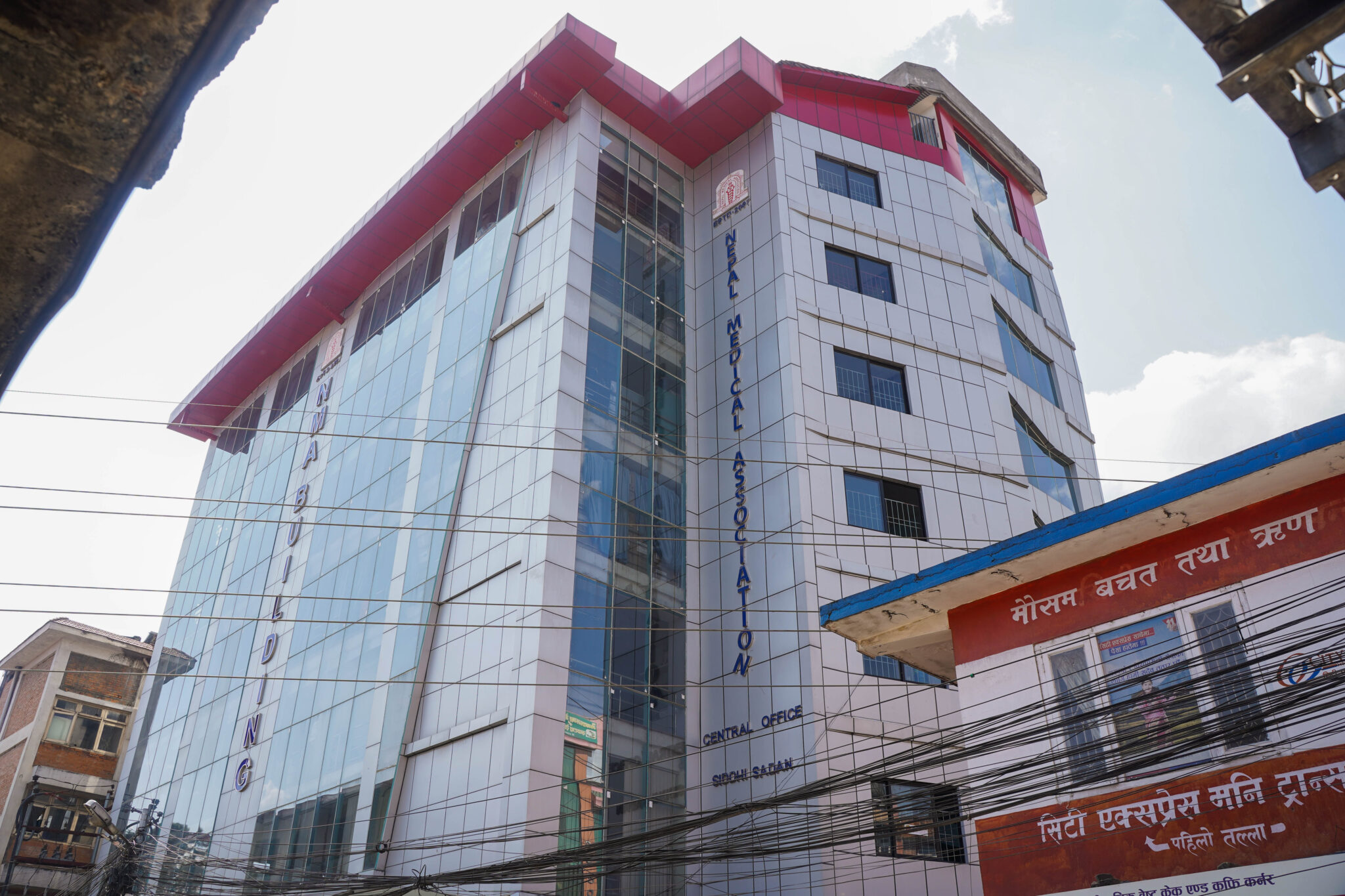
Nepal Medical Association’s business complex.
“There’s no issue about the government-granted land, we will construct a well-facilitated senior citizen home like Three Star and a hospital,” he said.
The government hasn’t also taken back ownership of lands outside the capital. Ganesh Man Singh Research Academy has received 10 bigha land in Jhapa, and Pushpalal Memorial Committee, Biratnagar has received 72 ropani land in Kanchanbari, Morang. Likewise, the UML’s Janakpur Zone Office and Dhanusa District Office have received 6 aana land. The government hasn’t been able to take back these lands either.
Lands granted to religious organisations haven’t been taken back either. Ownership rights of 24 ropani 11 aana land given to World Hindu Federation in October 2002 has already expired but the government hasn’t taken it back.
General secretary of the federation, Arun Poudel, says they can’t return the land now, adding that about one ropani of land given to them by the government is encroached upon by Neuro Hospital.
The government has provided 19 ropani 9 aana land to Brahmakumari Rajyog Service Centre in then Chhaling VDC, Bhaktapur; 13 aana to Sanatan Religion Committee in Kathmandu-10; 7 ropani 11 aana to the Shri Krishna Pranami Service Committee in Gothatar; and one ropani to the committee’s Bhaktapur branch. None of these lands have been returned to the government, despite their usage rights already getting expired.
A mockery of law
Recently, on July 7, 2022, the Land Management Ministry published a methodology related to public land, its use and lease in the national gazette, announcing that those organisations not complying with the provision—that is, not leasing public land—would have their ownership expired. Legal provisions also state that buildings on these types of land would automatically belong to the government.
Kajibahadur Bista, under secretary of the ministry’s land administration department, says no organisation except for Nepal Bhutpurva Sainik Association has applied to lease public land granted to them. According to him, legally, the usage rights of lands received by other organisations have already expired and they are mentioned as government land in official records. But still, those lands are yet to come into the government’s ownership in practice, Bista said.
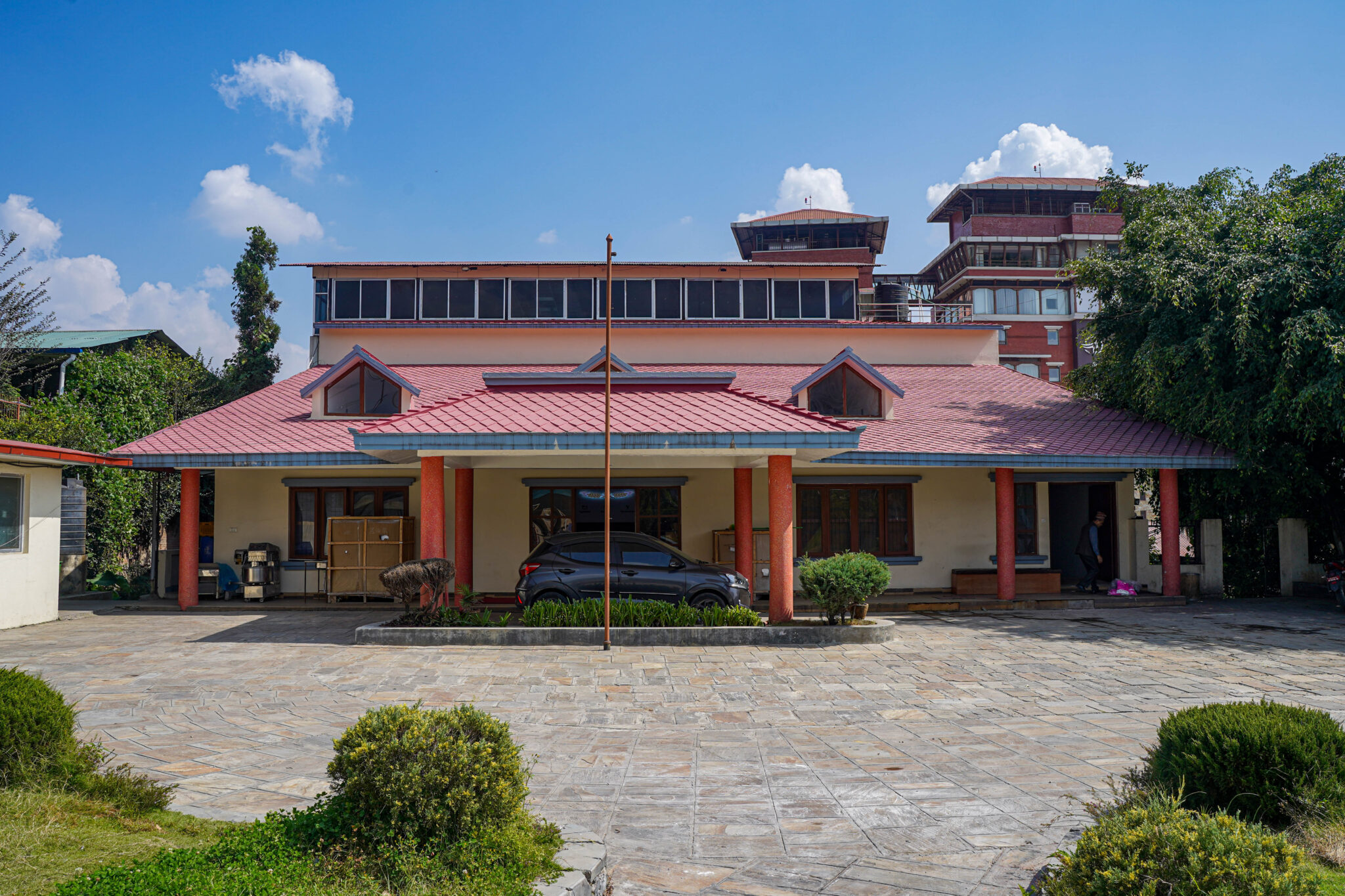
Building of Pasang Lhamu Mountaineering Academy built on government land.
Roshan Shankar Ghimire, director of the land administration bureau at Land Management and Record department, said that though his bureau has the rights to record those lands as government land, they don’t have the authority to vacate the occupants. “Lands not leased are being occupied illegally, but we alone can’t take them back,” Ghimire said.
The occupants are uninterested in leasing the land because once that’s done, they’d have to pay a certain amount annually to the government as per law.
According to the 2022 methodology, the occupants have to pay about 0.25 to 1.5 percent of the minimum valuation amount as lease fee.
Under secretary Joshi says the lands are being distributed on the basis of closeness in the name of usage rights. He says, “The occupants are reluctant to return back the lands because when they have usage rights, they can continue to occupy them without a time frame and without any responsibility. But if they have to lease it, they’d have to pay a certain amount.”
Former secretary of the Land Management Ministry, Gopinath Mainali, says that behind this sorry state of affairs is a weak administration and reluctance of political leadership.
Those who have received lands are usually those with closeness to power. Whatever may the law be, the officials don’t dare to affront the occupants, fearing repercussions and retribution,” Mainali said.
He further says that all of this shows the hypocrisy of the political parties and proves that they aren’t committed to following the rule of law.
“The officials can’t dare to affront organisations that have backing of political parties,” Mainali said. “It’s difficult to take back control of the land unless an honest leadership with moral integrity comes to power.”

